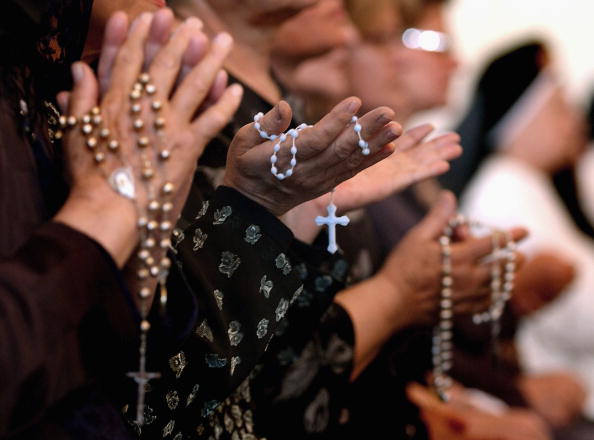4th Sunday of Advent, Year A.
December 19th, 2010
Matthew 1:18-24
Joseph, son of David, do not be afraid to take Mary your wife into your home. For it is through the Holy Spirit that this child has been conceived in her.
During the season of Advent we have the opportunity to develop the interior life, the life of prayer. We all ought to be taking time every day, and especially in these final days before Christmas, to meditate upon the events of Christ’s life. The saints will tell us that daily mental prayer is morally necessary for salvation – and they recommend around 20 minutes a day. Unless we are regularly considering the great works which God has done in the past and the ways he has revealed his love for us, we will be unable to trust in his love now in the present and to look forward to his future coming in glory.
And so, whether our Advent has been a particularly good time of prayer and meditation, or whether we have not been as reflective as we had hoped to be, the Church now gives us these final days before Christmas to re-commit ourselves to daily mental prayer.
Perhaps one reason why so many of us struggle with mental prayer and meditation is that we don’t really understand what we are supposed to be doing. What exactly should those twenty minutes be spent on? What is mental prayer?
The two most popular forms of mental prayer and meditation are surely the Rosary and Lectio Divina (prayerfully reading Sacred Scripture) – I would like to focus on the second: how do we make a meditation with the Bible?
Today’s Gospel passage offers us a good opportunity to see how mental prayer should work – we can pierce into the text and try to fill it out a bit, seeking to come to a deeper appreciation of the Holy Family. All the while, during a meditation, we must be primarily concerned to look into what the holy persons present in the Biblical narrative are thinking, feeling, doing and saying. What is Mary thinking? What is Joseph thinking? Moreover, we look to discover something of the love which was in the hearts of Mary and Joseph – this love then inspires us to love God in our turn.
First of all, in order understand the relationship between Mary and Joseph, we need to know something of the historical circumstances of their betrothal and marriage. This can be discerned from a careful reading of the Bible passages.
It seems that, when Joseph and Mary were betrothed, but before they come together, they both thought that their marriage would be a natural union. There is no reason to think that either Joseph or Mary knew what God had in store for them – this is why Mary is so surprised when the angel came with the good news at the Annunciation!
Nevertheless, although Mary and Joseph entered into their betrothal period, believing that their marriage would be a normal and natural one, Mary had a desire deep in her heart to become a consecrated virgin. She desired to be a virgin, but she also knew that she was supposed to marry St. Joseph – and so she really didn’t know what to think. But she trusted in God and she also trusted in Joseph, she knew that all would come to pass for the good.
After their betrothal, Mary revealed to St. Joseph that she had a desire to become a consecrated virgin – and you can imagine that this must have been something of a surprise to Joseph! But he was a good man and a just man; and, what is more, he loved and respected Mary very much, and so he took the matter to prayer. Ultimately, Joseph agreed and the two of them together vowed virginity, promising to live as brother and sister in their married life.
But how do we know that Mary was a consecrated virgin? Think of what she said to the angel – Gabriel told her that she would conceive and give birth to a son, but Mary was terribly confused. Why was she confused? She was troubled because she had just made the vow of virginity (together with Joseph) and she knew that virgins don’t ordinarily conceive and give birth to children. If she had not vowed virginity, Mary would have presumed that the child would be the son of Joseph; but it is because she was a virgin and intended to remain a virgin that Mary said to the angel, “How can this be? Since I do not know man.”
Mary then told St. Joseph that she was with child, but she did not explain to him the full circumstances of the conception – she did not tell Joseph about the angel and the Holy Spirit. And why not? Mary remained silent because she was very humble and she did not want to speak more about the divine mysteries than was necessary. Moreover, Mary trusted in St. Joseph, she loved him and she knew that he loved her. She trusted that Joseph, being a just man, would not make a rash decision, that he would not come to a false conclusion, but that he would wait and pray and see what the Lord had to tell him.
Additionally, we see the great faith which Mary had in God – she trusted that God would reveal all things in the proper time, she knew that he would reveal the truth to Joseph in a manner most fitting and most holy.
But what did St. Joseph think? Understandably, he was very confused. On the one hand, he knew his wife was a consecrated virgin, and he knew that she was very holy. Think about it: Joseph had known Mary for many years and he had never seen her commit even the least venial sin! Every time he saw her, everything he knew about Mary told him that she was holy, a woman of great prayer and great faith. And, what is more, Joseph loved Mary, he trusted her, his heart was exceedingly tender towards her – she was his great joy in this life.
But, on the other hand, Mary was now with child – and Joseph didn’t know what to think. I do not say that he doubted the purity of the Blessed Virgin Mary, I do not say that he suspected her of sin; I only say that Joseph was torn, that he was confused, and that his faith in God was proved in that he did not act rashly, but trusted in God and took the matter to prayer.
It was at this moment, during this time of trial and confusion, that the angel of the Lord came to Joseph in a dream and revealed the truth. Think of the faith which Joseph had – he believes in a dream! He is willing to stake his whole life, his reputation, everything all on a revelation given in a dream – what faith, and what love!
How tenderly Joseph received Mary into his home – and love filled his heart all the more, as he considered the Christ Child already present in the womb of the Virgin. How Joseph loved Mary and Jesus! How tenderly he watched over them as a father and lord.
Now we have seen what was in the hearts and minds of Joseph and Mary, the next stage would be to consider what love moved the Holy Trinity, as almighty God watched over the couple and guided Joseph and Mary through every difficulty. Finally, we would then consider the heart of Jesus; even in the womb, Jesus already knew and loved each and every one of us. How he loved his foster father Joseph. How he loved his Mother Mary. Even in those quite months, as he waited to come forth from the most pure womb of the Virgin and to be revealed to the world, Jesus was interceding in our behalf and meriting our salvation.











